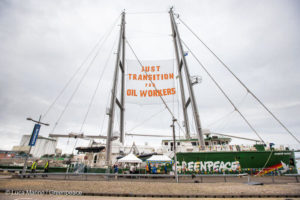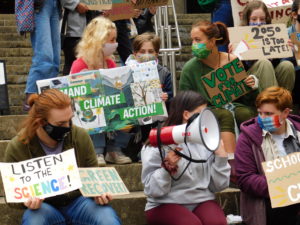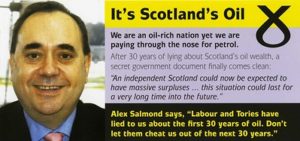Wales since the election
Wales is the one country within the United Kingdom where there has been a Labour administration over recent years. To many people’s surprise, including their own, Labour not only won the Senedd election in May but gained a seat overall. Geoff Ryan looks at some of what has been going on since then.
The Labour administration has had to deal with a number of issues, in particular climate change and the environment, housing; free school meals; the continuing Corona virus pandemic and of course the relationship between Wales and the United Kingdom have been high on their agenda
Climate Change and the Environment
One of the first acts of the new government was to introduce a new Ministry for Climate Change which has responsibility for transport, housing, planning, regeneration, energy and environment. The main function of the Ministry is to ‘ensure that all Welsh Government policy on new infrastructure projects, energy schemes, and planning decisions can meet environmental targets and be justified in the context of Wales’ current and future climate challenges’. Julie James, the Minister and Lee Waters, her deputy, are generally thought to be on the left of the party and close allies of First Minister Mark Drakeford.[3]
One of the first acts of the new ministry was to put a complete halt to all new road building. This was opposed by the Tories, many of whom still dream of getting the go-ahead for the M4 relief road near Newport despite Senedd majority against. At least one Labour MP, Mark Tami who represents Alyn and Deeside, has complained about the fact that the ‘red route’ linking the A55 to the A494 and A550 as been put on ice. And Cardiff Council is using £300,000 of its ‘clean air fund’ to make Castle Street wider for traffic while reducing the pavements – hardly an environmentally friendly step.[4]
Of course there are a few instances when new roads may have to be built. In fact the government quickly reversed its freezing of the Llandeilo bypass in Carmarthenshire, a road that has been planned for years and has become more necessary because of the number of HGVs passing through which have started to have a serious impact on the structural safety of some buildings as well as posing a threat to pedestrians in this small, picturesque town which attracts significant numbers of tourists.
The ban on road building has been followed up with proposals to introduce 20 mph speed limits in all built up areas, including villages. There are also proposals to ban all parking on pavements. While these proposals have been largely welcomed there has also been opposition. While the 20 mph limit is anathema to the Top Gear brigade who think they have a right to drive as fast as they see fit, the proposals on parking have often been criticised by local residents because many towns do not have wide enough roads to allow for parking close to one’s house.
But, in fact, there is a link between issues of speed and parking on pavements. For example, where I live, on a busy main road, some drivers frequently exceed the 30 mph limit. Because the road is narrow, despite being a main route, car owners often park partly on the pavement to avoid their car being damaged by the boy racers. Slowing down the traffic would mean there would not be the necessity to park on the pavements.
And of course there are far too many cars on the road. The problem in many areas is the lack of reliable public transport, especially in the evenings. Where I live it is impossible to go to Ammanford (about 8 miles away), never mind Swansea (15-16 miles) after about 18.30 other than by taxi or car. Given the enormous cost and scarcity of taxis, it is not surprising that many people rely on their own private transport. This problem is currently being taken up by the Labour Party in the Amman Valley with the intention of building a broad based campaign for regular and cheap public transport, preferably using electric vehicles.
The Welsh government is trying to develop an approach that recognises the linked nature of many issues. In my village, for example, there are proposals for a housing estate off my road and a hotel, holiday accommodation and a diving school further down the road at a former coal mine. While these projects may be beneficial for the village, they have potentially negative aspects such as considerably increasing the amount of traffic as well as creating problems for the already overburdened local school if significant numbers of children move to the new estate. Consequently plans for the estate and the diving school complex are on hold until all these issues can be resolved satisfactorily. No doubt this has been repeated throughout Wales.
Labour has also promised a national forest for Wales, stretching the length and breadth of the country. The aim is to plant 86 million trees in 9 years. This is very much a personal project for Mark Drakeford but is generally popular. Tory MP for Aberconwy Robin Millar has criticised the scheme for taking away farm land, mainly because he doesn’t understand, or pretends to not understand, the difference between reforestation (which is what is proposed) and afforestation i.e. the establishment if a forest where there has not previously been tree cover.
Swansea council has announced free buses for 4 days per week while it looks likely that the Swansea Bay metro may go ahead, with plans to link up much of west and south west Wales by public transport. Both these initiatives show there is considerable enthusiasm for environmental friendly projects. There are also plans to use ‘Homes As Power Stations’ in Neath Port Talbot and spreading to much of South West Wales.[5]
And, somewhat unusually for Welsh Labour, on 30 June the government supported the Plaid Cymru motion calling on the Senedd to declare a nature emergency as well as calling for legally binding biodiversity targets. This makes the Senedd one of the first Parliaments on the world to declare such an emergency. The holding of COP 26 in Glasgow later this year didn’t appear to have much impact on the Welsh Tories, 13 of whom voted against the motion.
Housing
Wales has a serious housing problem. According to Nation.Cymru (29 July 2021) 25,701 homes worth £4 billion pounds sit vacant across Wales.; partly because of second homes and holiday homes that are occupied for only a small part of the year. Though Janet Finch-Saunders, Tory spokesperson on housing, tried to dismiss the impact of second homes: perhaps she is influenced by the 7 residential and 4 retail properties she owns, as well as the trusteeship of a further 2 residential properties in Llandudno.
In addition, Wales has some of the oldest and least efficient housing in Western Europe, which impacts on climate change. According to Sophie Howe, Future Generations Commissioners for Wales a £15 billion retrofit plan would create 26,500 jobs by 2030 and would reduce fuel poverty. She recognises that there is a link between the climate emergency and fuel poverty. [6]
On Saturday 10 July, hundreds of protesters turned out at the Tryweryn dam to call for action from the Labour government to stop local people being priced out of the housing market by second home owners and to protect the Welsh language. Tryweryn is a potent symbol of Welsh resistance since the artificial lake there was created by the drowning of the Welsh speaking village of Capel Celyn against the wishes of the overwhelming majority of the population. The rally was addressed by, among others, Mabon ap Gwynfor the Plaid Cymru MS for the Dwyfor-Meirionnydd constituency in which Treweryn is to be found and Cian Ireland, former Labour candidate for the seat and a member of Labour For An Independent Wales.
Welsh language campaign Cymdeithas yr Iaith was involved in the protest, not least because one of the effects of second homes is to weaken the position of the Welsh language as villages are taken over by relatively wealthy incomers from England. To get some idea of the scale of second homes it was revealed in the week before the protest that almost half of all houses sold in the constituency in the previous 12 month were second homes.
And Norton Finance is encouraging investment in buy-to-let properties in Wales’ national parks, particularly the Brecon Beacons, while the Telegraph encouraged its readers to invest in the ‘staycation boom’ by snapping up a holiday home in Wales. Property clearly outranks the preservation of Welsh culture and language for them.
The Welsh government has published a plan for dealing with the second home crisis but this has been called ‘weak’ by Plaid Cymru and Cymdeithas yr Iaith. Mark Drakeford has also said he will explore the possibility of a ‘tourist tax’. This, not surprisingly, attracted the hostility of the Tories. Yet the idea is not totally farfetched: certainly it’s not unusual to pay a local tax, collected as part of a hotel bill, in a number of other European countries.
Wales and the UK
After the election Mark Drakeford published Reforming Our Union [7]( a follow up to a previous version originally published a few years ago and also We The People[8] largely identified with Mick Antoniw, a left wing member of the government and now Counsel General and Minister for the Constitution. Drakeford and Antoniw are both in favour of maintaining the UK though, as Mark Drakeford recognises in his foreword, this is becoming increasingly harder to argue. But they certainly want significant changes, though stopping short of independence.
In fact, the Tories have made it harder and harder for Drakeford to hold back demands for independence and indeed at times they behave as if they want to break up the UK. The ridiculous attempt to prevent journalists referring to the 4 nations and insisting there is only one British nation ( at a time when England, Scotland and Wales all had their own teams playing in the Euros), the demand that the union flag (aka the butcher’s apron) be flown higher than the Saltire or Red Dragon on all government buildings, the demand that children in Welsh and Scottish schools sing the dire We Are Britain anthem on ‘One Britain, One Nation Day’ (totally ignored in Welsh schools, schools in Scotland were already on holiday) has now been upstaged by the plan to install a 100 foot union flag on the UK Government’s tax office in Cardiff. Tory MP Darren Millar welcomed this display of imperial rule and demanded the Welsh government took action against Yes Cymru for a proliferation of stickers.
All of this comes against a backdrop of increasing hostility to Wales and the Welsh language among sections of English people. Most recently Carol Decker, singer with T’Pau, who was born in Shrewsbury and lives on the English-Welsh border, claimed that a supermarket in a photo she was shown couldn’t be in the UK because some of the signs were in a ‘foreign’ language. They were: Welsh, a language Ms Decker must have come across many times given where she grew up and continues to live.
Guardian writer Rhiannon Lucy Coslett was recently abused online after she wrote an article Wales eerily beautiful slate quarries are getting the recognition they deserve after the North Wales slate quarries were awarded World Heritage Status. The editor of the Spectator joked about the Welsh language after Labour deputy leader Angela Rayner accidentally typed nonsense in a tweet. TV newsreader Huw Edwards was told to take off his mask by a fellow passenger on the London underground because they objected to the red dragon flag of Wale on said mask. English newspapers complained about the ‘bias’ of Gaby Logan and her team when reporting on Wales’ matches in the Euros (unlike the totally neutral English media!) And the list goes on.
Perhaps worst of all in its attitude to the Welsh language was an article written by a Belfast based sociologist Dr. James Dingley for the Unionist supporting The News Letter in which he compared the Welsh language movement to the Nazis.[9]
Even the relatively mild proposal from the Welsh government that public servants should be able to speak a few Welsh phrases (not at a level where they could compete at an Eisteddfod, just a few simple phrases to answer the telephone, greet someone) was met with considerable hostility from the Tories for whom Wales is essentially an English colony. I can’t speak Welsh but I think I could meet the requirements set out by the government.
A Crisis in Yes Cymru
Unfortunately this is all taking place against a serious crisis in Yes Cymru, the campaign for Welsh independence[10].
Exactly what has been happening is unclear. One of the complaints is the lack of minutes. There have been a number of resignations from the recently elected Central Committee and Sion Jobbins, one of the founders of the organisation, has stepped down as National Secretary. Some members of the CC have been suspended. Allegations of harassment and bullying have been made. Most of the allegations and complaints about different issues are very vague, don’t give names etc so it is difficult to work out exactly what is going on.
However, it is quite likely there has been an orchestrated campaign by right-wing currents against the largely left-wing leadership elected at the last AGM. The right didn’t put much effort into the election and are now attempting to oust the left. Apart from the allegations of bullying etc the opponents of the left are insisting that Yes.Cymru must be an organisation solely committed to achieving independence. I don’t think there are any currents inside Yes.Cymru which disagree with this; the real problem for them is that the left (Labour For An Independent Wales, Undod) have gained places in the leadership which sections of the membership seem to believe makes it impossible for Yes.Cymru to remain a broad based campaign.
But seriously, anyone who believes that members of the thoroughly unionist Conservative and Unionist Party (the clue’s in the name) or the equally pro-unionist Liberal Democrats are going to join and work with Yes.Cymru to break-up the union to which they are thoroughly committed is living in a fantasy land. It may be possible to attract a few Tory or Lib Dem voters but there is zero chance of winning the parties to support for Welsh independence. Realistically only Plaid Cymru and sections of the Labour Party, along with the Greens and far-left, are going to seriously champion independence for Wales.
There may be another AGM later this year and the remaining members of the current CC will remain in place until then though many members are unhappy with even that proposal and want an EGM as soon as possible and the current CC to step down. And the remaining members of the Central Committee are not helping themselves by a failure to recognise there may be some justification for the complaints, dismissing the views of local branches far too readily.
The destruction of Yes Cymru would be a major defeat for all those committed to independence. Both sides need to row back immediately from a potentially damaging split.
Free School Meals
While the Labour government’s record on the environment has much to commend it they have completely failed on the issue of free school meals. This was a major issue before, during and since the Senedd elections. Wales had, and continues to have, the worst provision of free school meals of any of the nations of the UK. The Bevan Foundation, the Child Poverty Action Group Wales have both been active in calling for an extension of the provision, as has Labour MP Beth Winter. But much of the lead has been taken by People’s Assembly Wales (PAW), in conjunction with the others. There finally appears to be some movement by the government with letters being exchanged between Vicky Howells MS, Chair of the Senedd Labour Group and Len Arthur of PAW and Pasty Thomas-Turner of Unite Community Wales.[11] This is at least a step forward since previously the Labour Group has tended to ignore criticism of its policy on providing free school meals and has voted down resolutions in the Senedd from Plaid to expand the provision with the entire Labour Group, including the supposed left-wingers, voting as one.
Coronavirus
From Saturday August 7, most restrictions in Wales have come to an end, several days earlier than in England despite Boris Johnson’s boastful ‘Freedom Day’. For virtually the first time Keir Starmer has spoken out in support of the Labour government in Wales. He has usually been silent or supported Johnson and ignored Mark Drakeford.
While there have been some anti-restrictions, anti-vax protests in Wales they have generally been on a much smaller scale that in England, though the most recent saw a few hundred people outside Drakeford’s home.
This is very much an aberration. The Welsh Labour government has generally been credited with running a more efficient (and more humane) Covid campaign than their English counterparts. Wales, despite a slow start, has now vaccinated more people than any UK nation and, indeed, has one of the best records in the world.
Despite the trolls, particularly on WalesOnline, and the protests outside his house, Drakeford has a much higher satisfaction level than Johnson. Of course this is partially because he is the First Minister in Wales and therefore attracts support from people in Wales whereas Johnson is identified much more with the UK or, especially, England. But it is also because at least some of the praise for the Welsh government’s handling of the crisis is justified.
Nevertheless we should not ignore some unpleasant facts. WalesOnline may be seen as a cheerleader for the Welsh government, especially by Unionist and anti-Labour trolls who constantly spread vitriol in the comments section, but it has posed some difficult questions for the Welsh government. The refusal of the Welsh government to agree to a Wales specific enquiry into the handling of the pandemic is particularly problematic – but was reiterated on August 6 by the new Health Minister Eluned Morgan.[12]
On its refusal to hold an enquiry into its handling of the Covid pandemic and its unwillingness to increase the numbers entitled to free school meals the Welsh government certainly should be held to account. Unfortunately we don’t appear to have an equivalent figure to Marcus Rashford so that puts the onus on the left in Wales to work together to support the government when they deserve our support and to fight them whenever necessary. Left Unity in Wales has recently issued a letter in which they appeal for the Welsh left to create an ecosocialist, radical independence current. This would certainly be a step forward and one Anti*Capitalist Resistance welcomes.
Source: AntiCapitalist Resistance
[1] Mark Drakeford formed a Labour led administration in Wales in 2018 when he took over as First Minister from Carwyn Jones.
[2] The unicameral chamber that runs devolved matters in Wales has been the Sennedd (Parliament) since May 2020 See https://en.wikipedia.org/wiki/Senedd for more details of the history and of devolved powers
[3] For a good analysis of the setting up of the Ministry and Labour’s actions in the first few week after the election see this article by Sean Thompson on Red Green Labour.
[4] By far the most disruptive and stupid of Welsh MPs is Chris Bryant who defended the suspension of Dawn Butler and complained that the new Peruvian government wasn’t centrist enough and got involved in a spat with an academic who knows a lot more about Peru than Bryant. He has been accused of having a hostile attitude to the Welsh language, while encouraging young people to learn a second language. Presumably Bryant would prefer those young people to learn Castillian, which he speaks fluently, to Welsh. The sooner the working class of the Rhondda can replace him the better.
[5] https://www.southwalesguardian.co.uk/news/19474735.thousands-homes-south-west-wales-become-power-stations/?ref=rss&IYA-mail=6d6eabaf-a701-4b57-aa60-ee39a5436952
[6] https://nation.cymru/news/15bn-plan-to-retrofit-existing-homes-in-wales-could-eradicate-fuel-poverty-says-future-generations-commissioner/
[7] https://gov.wales/reforming-our-union-shared-governance-in-the-uk-2nd-edition
[8] https://labourlist.org/2021/01/constitutional-reform-is-key-labour-needs-an-agenda-for-a-radical-federal-uk/
[9] https://nation.cymru/opinion/knowing-a-few-welsh-words-really-isnt-too-much-to-ask-for-a-job-with-the-government/; https://nation.cymru/news/huw-edwards-told-to-take-off-covid-mask-because-it-had-a-welsh-dragon-on-it/; https://nation.cymru/news/belfast-based-academic-compared-welsh-language-movement-to-nazis/
[10] See my earlier article here; https://anticapitalistresistance.org/why-is-welsh-independence-suddenly-being-taken-seriously/
[11] https://docs.google.com/document/d/1rlsYpJPa1WKH9XIBez0RqZH79p3HeJ29LLNYbCZJV-o/edit?usp=sharing; https://pawalescymru.blogspot.com/2021/06/our-post-senedd-election-free-school.html;
[12] https://www.walesonline.co.uk/news/politics/welsh-government-coronavirus-covid-mistakes-21107573?utm_source=wales_online_newsletter&utm_campaign=politics_newsletter2&utm_medium=email; https://www.walesonline.co.uk/news/wales-news/eluned-morgan-interview-health-minister-21241975?utm_source=wales_online_newsletter&utm_campaign=politics_newsletter2&utm_medium=email




